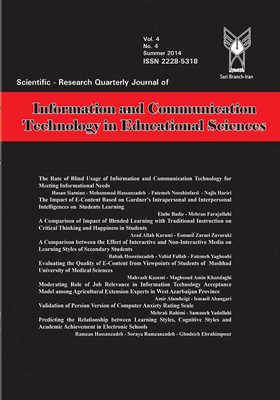Predicting the Relationship between Learning Styles, Cognitive Styles and Academic Achievement in Electronic Schools
Subject Areas : Infomartion Technology
Ramzan Hassanzadeh
1
*
![]() ,
Soraya Ramzanzadeh
2
,
Ghodsieh Ebrahimpour
3
,
Soraya Ramzanzadeh
2
,
Ghodsieh Ebrahimpour
3
1 - Associate Professor, Department of Psychology, Islamic Azad University, Sari Branch, Sari, Iran
2 - Instructor, Islamic Azad University, Bandar Gaz Branch, Bandar Gaz, Iran
3 - Instructor, Islamic Azad University, Bandar Gaz Branch, Bandar Gaz, Iran
Keywords: academic achievement, cognitive styles, learning styles, electronic schools,
Abstract :
The purpose of this study was to predict the relationship between learning styles, cognitive styles and academic achievement in electronic schools. It was a descriptive correlational study. Participants of this research were 150 first year male students enrolled in electronic schools in Tehran in 2013, who were selected using random cluster sampling method. They answered the Kolb learning style inventory measuring four learning styles (convergent, divergent, assimilation and adaptation) and Witkin's Group Embedded Figures Test (GEFT) measuring two cognitive styles (field dependence and field independence). The average scores of the students at the end of the school year were also used to measure academic achievement. The data were analyzed using Stepwise Regression and Pearson Correlation Coefficient. The findings revealed a significant relationship between participants' learning styles and academic achievement. There was also a highly positive and statistically significant relationship between their cognitive styles and academic achievement. The style mostly preferred by the students as the dominant style was absorber (51.3%) and the least preferred style was accommodation (6%). The findings also revealed that both learning and cognitive styles could play an important role, as two important variables, in students' academic achievement.

